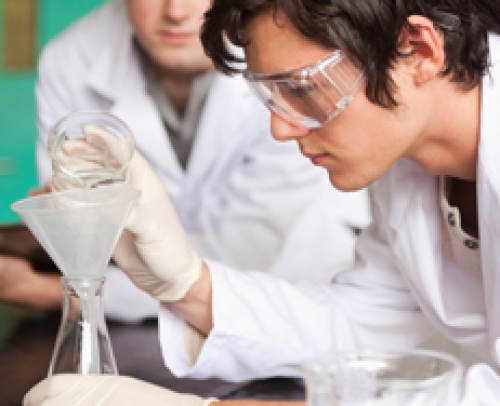Many teachers will have begun planning for the new A-level chemistry specification which will start from september 2015.
Planning what practicals to run with your students and having a back-up plan can be time consuming but don't worry help is at hand.

Chrissie Maitland our Education Coordinator for the South East shares her A-level practical collection guide:
This guide has been written to help teachers make the most of the new practical assessment for students. Each exam board will provide a set of standard experiments that they recommend their teachers do, however, most of the exam boards are being flexible and are allowing teachers to choose the experiments they ask their students to complete. This guide gives a series of alternative experiments that match with the practical apparatus and techniques, so that you have the freedom to choose which experiments you do. Moreover, if you have students who have found some of the techniques difficult, but you don’t want to make them repeat the same experiment, then this guide again offers alternatives to help your student’s to master these techniques.
This resource on Learn Chemistry contains the most up-to-date version of the mapping table which now includes the WJEC specifications.
New Specification A-level: Practical Apparatus and Techniques
| |
Apparatus and Techniques |
| 1 |
use appropriate apparatus to record a range of measurements (to include mass, time, volume of liquids and gases, temperature) |
| 2 |
use water bath or electric heater or sand bath for heating |
| 3 |
measure pH using pH charts, or pH meter, or pH probe on a data logger |
| 4 |
use laboratory apparatus for a variety of experimental techniques including:
- titration, using burette and pipette
- distillation and heating under reflux, including setting up glassware using retort stand and clamps
- qualitative tests for ions and organic functional groups
- filtration, including use of fluted filter paper, or filtration under reduced pressure
|
| 5 |
use volumetric flask, including accurate technique for making up a standard solution |
| 6 |
use acid-base indicators in titrations of weak/strong acids with weak/strong alkalis |
| 7 |
purify:
- a solid product by recrystallization
- a liquid product, including use of separating funnel
|
| 8 |
use melting point apparatus |
| 9 |
use thin-layer or paper chromatography |
| 10 |
set up electrochemical cells and measuring voltages |
| 11 |
safely and carefully handle solids and liquids, including corrosive, irritant, flammable and toxic substances |
| 12 |
measure rates of reaction by at least two different methods, for example:
- an initial rate method such as a clock reaction
- a continuous monitoring method
|
Comparison Table – Practical Technique vs Exam board experiments
| Practical Technique |
AQA Experiment Numbers |
Edexcel Experiment Numbers |
OCR A and B Practical Activity Groups |
Eduqas Topic References |
| 1 |
1,2,3,7,9,10 |
1,2,4,6,8,11,12,13,14,16 |
1,2,3 |
C1.6,C2.1,C2.2, C2.3, PI1.2, PI3, PI5.1 |
| 2 |
3,4,5,6,10,11 |
4,5,7,15,16 |
5,6,7 |
C3.3,C3.4,OA4 |
| 3 |
6,9,11 |
9 |
2,11 |
PI5.2 |
| 4 |
1,2,4,5,6,9,10,11 |
1-16 |
2,4,5,6,7 |
C1,6,C2.1,C3.3,C3.4,PI1.2,PI5.1, PI5.2,OA2.2,OA4 |
| 5 |
1 |
2,3,11 |
2,11 |
C2.1,Pl1.2 |
| 6 |
9 |
2,3,13 |
2,11 |
C2.1 |
| 7 |
10 |
5,6,12,16 |
5,6 |
OA4 |
| 8 |
10 |
15,16 |
6 |
OA2.2, OA4 |
| 9 |
12 |
5,6,16 |
6 |
OA4 |
| 10 |
8 |
10 |
8 |
PI1.1 |
| 11 |
1-12 |
1-16 |
1-12 |
C2.1,C2.2,C3.3,PI1.2,OA2.2,OA4 |
| 12 |
7 |
13 |
9,10 |
C2.3, PI3 |
Practical techniques and suitable practical’s from Learn Chemistry
(matched were possible to the specification core experiments)
| Practical Technique |
Experiments from Learn Chemistry |
Exam Board Experiment |
| 1 |
Interactive Lab Primer – Lab Apparatus
The Volume of Hydrogen Gas
The Formula of Hydrated CuSO4
Finding the Formula of an Oxide of Copper
Weighing Gases
Heats of Reaction
Exothermic and Endothermic
A Reversible Reaction
Measuring Enthalpy Changes
Neutralisation – ‘Curing Acidity’
Thermometric Titration |
OCR 1; Edexcel 1; Eduqas C2.3
Eduqas PI1.2
Eduqas PI1.2
AQA 2; Edexcel 8
AQA 2; Edexcel 8; Eduqas PI1.4
AQA 2; Edexcel 8
AQA 2; OCR 3; Edexcel 8; Eduqas C2.2, PI4.1 |
| 2 |
Fractional Distillation of Crude Oil
Limonene from Oranges and Lemons
Aspirin (or Aspirin) also Pre-lab resource
Paracetamol |
AQA 5
AQA 5, 10; Eduqas OA4
AQA 10; OCR 6; Edexcel 16; Eduqas OA4 |
| 3 |
Neutralisation of Indigestion Tablets
On the Acid Trail
Universal Indicators
pH of Oxides
Neutralisation – ‘Curing Acidity’
Gifted and Talented Chemistry – ‘Acids and Alkalis’ |
AQA 1; OCR 2, 11; Edexcel 2, 3; Eduqas C2.1
AQA 9; OCR 2, 11; Edexcel 9; Eduqas C2.1
AQA 9; OCR 2, 11; Edexcel 9; Eduqas C2.1
AQA 9; OCR 2, 11; Edexcel 9; Eduqas C2.1 |
| 4 |
Interactive Lab Primer – Titration
Interactive Lab Primer – Distillation
Interactive Lab Primer – Reflux
Interactive Lab Primer – Filtration
Limonene from Oranges and Lemons
Neutralisation of Indigestion Tablets
Titration of NaOH with HCl
Fermentation
Testing Salt for Anions and Cations
Flame Tests
Testing for Negative Ions
Reactions of Positive Ions
Reactions of the Halogens
Fractional Distillation of Crude Oil
The Oxidation of Alcohols
Analysis of Aspirin Tablets
Chromium, Molybdenum and Tungsten
Aspirin (or Aspirin)
Tannin in Wine
Copper in Brass
Testing for Aldehydes and Ketones
Properties of Ethanoic Acid
Testing for Unsaturation
Properties of Transitions Metals
Halogen Compounds
Gifted and Talented Chemistry – ‘Acids and Alkalis’
Creative Problem Solving - ;Five White Solids’
Detecting Aspartame
Paracetamol
Hydration of Alkenes
Thermometric Titration
Silver and Lead Halides |
AQA 5, 10; Eduqas OA4
AQA 1; OCR 2, 11, Eduqas C2.1
AQA 1; OCR 2, 11; Edexcel 2, 3
AQA 10; Eduqas C3.4
AQA 4, 11; OCR 4; Eduqas C1.6
AQA 4; OCR 4; Edexcel 7, 15; Eduqas C1.6
AQA 4; OCR 4; Edexcel 7, 15; Eduqas C1.6
AQA 4, 11: OCR 4; Edexcel 7, 15; Eduqas C1.6
Eduqas C1.6
AQA 5
AQA 6; OCR 5; Edexcel 5
AQA 1; OCR 2
AQA 11; OCR 4; Edexcel 15
AQA 10; OCR 6; Edexcel 16; Eduqas OA4
Edexcel 11
Edexcel 11
AQA 6; OCR 7; Edexcel 7, 15; Eduqas C3.4, OA2.2
AQA 6; OCR 7; Edexcel 7, 15; Eduqas C3.4
AQA 6; OCR 7; Eduqas C3.2
AQA 4, 11; OCR 4; Edexcel 7, 15
Eduqas C3.3
AQA 10; OCR 6; Edexcel 16; Eduqas OA4
AQA 4; OCR 4; Edexcel 7, 15; Eduqas C1.6 |
| 5 |
Interactive Lab Primer – Standard Solution |
AQA 1; OCR 1, 2 |
| 6 |
On the Acid Trail |
AQA 9; OCR 2; Edexcel 9; Eduqas C2.1, PI5.2 |
| 7 |
Interactive Lab Primer – Recrystallisation
Interactive Lab Primer – Separating Funnel
Paracetamol
Hydration of Alkenes
Purifying an Impure Solid |
OCR 6; Eduqas OA4
OCR 5; Eduqas OA4 |
| 8 |
Interactive Lab Primer – Melting Point
Observing the lowering of Melting Point
Paracetamol |
AQA 10; OCR 6; Eduqas OA4
AQA 10; OCR 6; Eduqas OA4 |
| 9 |
Interactive Lab Primer - TLC
Chromatography of Leaves
Aspirin (or Aspirin) also Pre-lab resource
Chemistry Masterclass
Detecting Aspartame
Paracetamol |
AQA 12; OCR 6
AQA 10, 12; OCR 6; Edexcel 16; Eduqas OA4
AQA 12; OCR 6 |
| 10 |
Electricity from Chemicals
Accumulator
Gratzel Cell
Kitchen Currents |
AQA 8; OCR 8; Edexcel 10; Eduqas PI1.1
AQA 8; OCR 8; Edexcel 10; Eduqas PI1.1
AQA 8; OCR 8; Edexcel 10; Eduqas PI1.1 |
| 11 |
All Experiments
Interactive Lab Primer – Working Safely |
All Experiments |
| 12 |
Rate of Reaction – Concentration and Temperature
Rate of reaction - Temperature
Rate of Reaction - Concentration
Iodine Clock
Finding the rate expression
Rate of Reaction – Magnesium and Hydrochloric acid
Rates and Rhubarb
Old Nassau |
AQA 3, 7; OCR 9; Eduqas C2.3
AQA 3, 7; OCR 9; Eduqas C2.3
AQA 7; OCR 9; Eduqas C2.3
AQA 7; OCR 10; Edexcel 13; Eduqas C2.3
AQA 7; OCR 10; Edexcel 13; Eduqas C2.3, PI3 |
For more information you can also review an earlier
forum post or just search
Learn Chemistry for your choice of over 400 class practicals and demonstrations.
For those new to Learn Chemistry please note you can also visit our dedicated
experimentation hub for teachers looking for practical resources.
By:
Lee Page, Royal Society of Chemistry, Education Executive.
Chrissie Maitland, Royal Society of Chemistry, Education Coordinator (South East)


